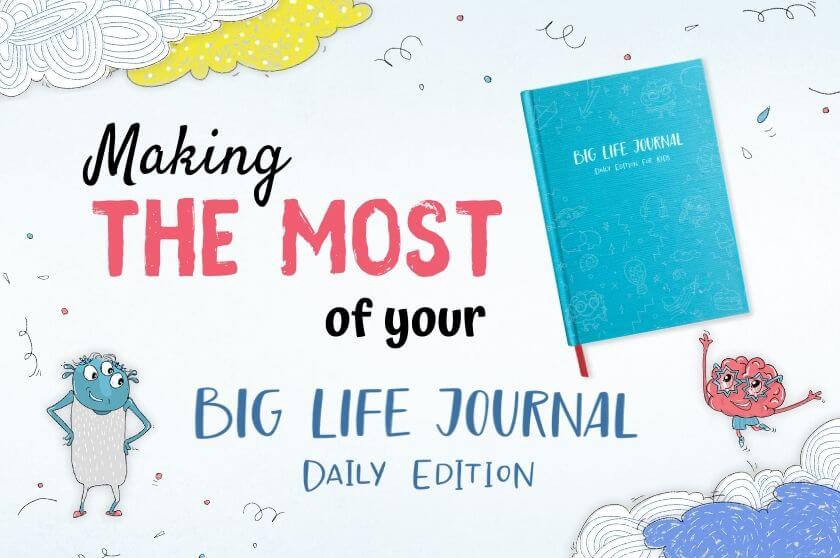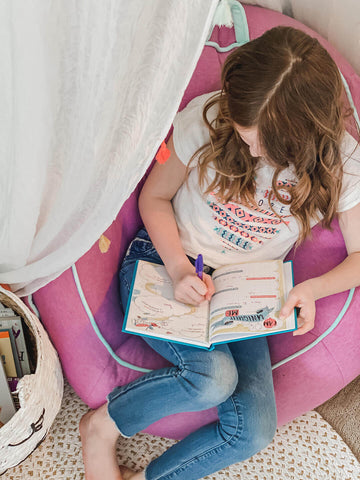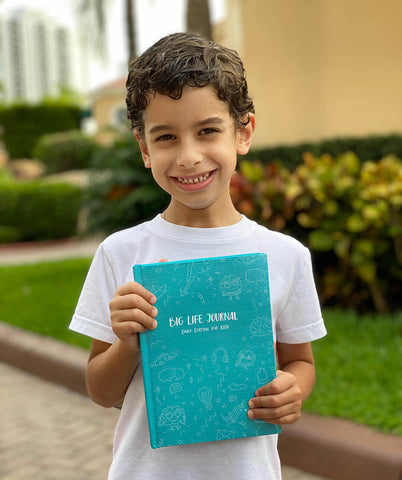
How to Make the Most of Big Life Journal—Daily Edition
The Big Life Journal—Daily Edition guides children through the process of exploring their feelings, reflecting on their experiences, and practicing gratitude.
Each journal page provides a place for children to document their feelings, as well as various prompts to help develop important life skills of self-reflection and introspection.
Your child will love the main characters, Brain and Monster, who teach valuable lessons about growth mindset, gratitude, kindness, goal-setting, and more.
This journal will inspire resilience, confidence, and self-love. In this quick-start guide, we’ll discuss how to make the most of your Big Life Journal—Daily Edition.
Before you continue, we thought you might like to download the FREE Our Gratitude Tree. Take this opportunity to rethink gratitude and authentically teach children to appreciate what they have. Use this activity to jumpstart conversations and actions around appreciation for one another and how grateful you are to have each other as a family.

Why is daily journaling important for children?
Research shows keeping a daily journal offers so many wonderful benefits for both mental and physical health. The Big Life Journal—Daily Edition is designed to maximize these benefits for children.
Specifically, the Big Life Journal—Daily Edition offers the following benefits:
- The journal creates a simple 5-10 minute daily routine, which helps children develop positive life habits, such as introspection, self-reflection as well as practicing daily gratitude.
- Children will learn to “train their brains” for resilience, confidence, gratitude, kindness, and self-love while writing in this journal.
- The journal shows young people how they can express their feelings and evaluate their inner world.
- Used as part of the bedtime routine, the journal can help children focus on encouraging self-loving thoughts as they drift off to sleep.
- Children are given space to think about their day and place focus on the good things that happened. They also have the opportunity to speak about the 'not-so-good' parts of their day and think about how those can be improved.
- Using this journal is an excellent way to encourage your child to reveal their thoughts and speak about the joys and troubles they encounter every day.
- While using the journal, your child will feel comfortable discussing their feelings and innermost thoughts.
Consider This BEFORE Starting the Journal
Set Intentions: Why do you want your child to do this?
Think about what you would most like your child to gain from using this journal. For instance, are you hoping to help your child gain more confidence? Or perhaps practicing getting in touch with, and processing, their own feelings? Does your child need a safe space to process their day? Would you like to help your child focus on positive thoughts before going to sleep? It’s helpful to have an idea of what you would like to emphasize and prioritize before you begin.
Model: How will you model daily journaling?
For some children, sticking with writing in a daily journal may be challenging. Consider keeping your own journal as an example for your child to follow. Make it a ritual the two of you do together.
Learn About Growth Mindset: How much do you already know?
As you discuss the topics in the Big Life Journal—Daily Edition with your child, it’s helpful to have a working understanding of growth mindset. You will understand the activity goals and prompts included in this journal much more, which in turn will make you better equipped for more meaningful and inspirational discussions with your child. If you’re a growth mindset beginner, start by reading our 4-Week Guide to Growth Mindset.
How to Introduce the Big Life Journal—Daily Journal to Kids
Get excited about introducing the Big Life Journal—Daily Edition to your kids, and they will be more likely to mirror your excitement.
Introduce the journal as a fun, relaxing activity. Mention the benefits of keeping a daily journal, such as a boost of confidence, gratitude, and positivity. Explain why you’re excited about the journal to pique your child’s curiosity and enthusiasm.
Finally, make it fun with colorful pens, colored pencils, and inspirational stickers.
Where to Begin
Explain there’s no right or wrong way to begin the journal. After all, the journal belongs to your child; it’s a personal, creative space where they are allowed to make the rules.
One suggested pathway is to start with the “I Am Uniquely Me” pages (4-5), then complete the intro pages (6-11). These pages introduce growth mindset concepts and healthy strategies for coping with feelings in a colorful, kid-friendly fashion.
Setting Your Child Up for Success
- Choose a time of day to write in the journal, making sure it’s a convenient time your child can manage consistently. For instance, you may want to write in the journal before bedtime, and then discuss it. Or, you can journal before dinner and use the prompts as a mealtime conversation.
- Have realistic expectations. While consistency helps create healthy habits, it’s OK to skip some days. The journal is supposed to be relaxing and enjoyable, so don’t turn it into a high-pressure situation for you or your child.
- Remember the writing prompts are suggestions. If there’s something else your child feels the need to write about that day, go for it! You can also feel free to customize questions and prompts so they are more specific to your child and their interests.
- Pair it with a fun activity. Share a favorite snack while you journal, or make it a routine to do one of your child’s favorite hobbies/activities before or after your Big Life Journal— Daily Edition session. If it’s not distracting for your child, play quiet background music while you write—perhaps a playlist of our 80 Songs That Inspire a Growth Mindset. Another idea is to have a “Coffeehouse Time” with your children! Invite your children into a “coffeehouse” in your home, complete with yummy treats and quiet music. Have “coffee” and journaling time. Children are engaged and excited, and they think it’s fun to go to a “coffee shop” and do their journals. You can tell them, “Let’s go to the coffeehouse!” and they’ll know exactly what you mean.

Answers to Frequently Asked Questions
Should the journal be completed by the child alone or with a parent?
The Big Life Journal—Daily Edition is designed to be completed individually. However, after your child completes their journal entry, you can ask prompting questions to spark conversation. It’s a good way to bond with your child and talk about important topics.
My child does not enjoy writing. What techniques can I use to encourage my child to begin?
There are many ways to engage your writing-resistant child in the journal. Remember not to make it a high-pressure situation. Offer to be the scribe, asking your child to simply dictate the words they’d like you to write in the journal. Use alternatives like chalkboards or dry erase boards or allow your child to sing, act, or even craft a response with Play-Doh™. The journal is less about writing and more about expression, so there is no wrong way for them to express their thoughts or feelings.
How can the journal link in with Big Life Journal kits, the podcast, and other resources?
Make the journal a multisensory experience by listening to our Big Life Kids Podcast and pairing it with colorful printables from our Big Life Journal Printable Kits and blog. Many of these resources are free and reinforce the concepts and benefits of the Big Life Journal—Daily Edition.
Let Your Big Life Journal—Daily Edition Journey Begin!
The experience of getting in touch with their feelings and the inner world will increase your child’s confidence, resilience, and self-love while continuing to instill a growth mindset. Plus, the journal will spark meaningful conversations to help you and your child bond.
As your child begins the practice of keeping a daily journal, these tips and suggestions will make the journey as smooth and successful as possible. Enjoy walking this path with your child!


